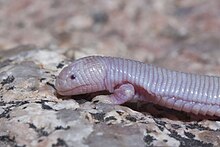Bipes (lizard)
| Bipes | |
|---|---|

| |
| Mexican mole lizard (Bipes biporus) | |
| Scientific classification | |
| Domain: | Eukaryota |
| Kingdom: | Animalia |
| Phylum: | Chordata |
| Class: | Reptilia |
| Order: | Squamata |
| Clade: | Amphisbaenia |
| Family: | Bipedidae |
| Genus: | Bipes Latreille, 1801 |
| Species | |
|
Bipes biporus (Cope, 1894) | |
Bipes is a genus of amphisbaenians (or worm lizards) found only in Mexico, the sole living member of the family Bipedidae.[2] They are carnivorous, burrowing reptiles, but unlike other species of amphisbaenians, they possess two stubby forelimbs placed far forward on the body.[3] They also retain an almost complete pectoral girdle.[4] The shovel-like limbs are used to scrape away soil while burrowing, in a manner similar to a mole.[5] Evidence for their occurrence in the United States is reviewed by Somma (1993).
References
- ^ "Bipes". Integrated Taxonomic Information System.
- ^ Longrich, Nicholas R.; Vinther, Jakob; Pyron, R. Alexander; Pisani, Davide & Gauthier, Jacques A. (2015). "Biogeography of worm lizards (Amphisbaenia) driven by end-Cretaceous mass extinction". Proceedings of the Royal Society B: Biological Sciences. 282 (1806): 20143034. doi:10.1098/rspb.2014.3034. PMC 4426617. PMID 25833855.
- ^ "5 Amazing Creatures You May Find While Adventuring". What am I doing online?. Archived from the original on 2012-12-16. Retrieved 2013-01-26.
- ^ Westphal, Natascha; Mahlow, Kristin; Head, Jason James & Müller, Johannes (2019-01-10). "Pectoral myology of limb-reduced worm lizards (Squamata, Amphisbaenia) suggests decoupling of the musculoskeletal system during the evolution of body elongation". BMC Evolutionary Biology. 19 (1): 16. Bibcode:2019BMCEE..19...16W. doi:10.1186/s12862-018-1303-1. PMC 6329177. PMID 30630409.
- ^ Gans C (1998). Cogger HG; Zweifel RG (eds.). Encyclopedia of Reptiles and Amphibians. San Diego: Academic Press. pp. 216–217. ISBN 0-12-178560-2.
Further reading
- Latreille PA (1801). In: Sonnini CS, Latreiile PA (1801). Histoire naturelle des reptiles, avec figures desinées d'après nature; Tome II. Premiere partie. Quadrupèdes et bipèdes ovipares. Paris: Crapalet. 332 pp. (Bipes, pp. 90–96.)
- Taylor EH (1951). "Concerning Oligocene Amphisbaenid Reptiles". University of Kansas Science Bulletin 34 (9): 521–579. (Bipedidae, p. 522.)
- Somma, Louis A. (1993). "Do Worm Lizards Occur in Nebraska?" Nebraska Herpetological Newsletter 12 (2): 1–10
External links
- "Family Bipedidae (Two-legged Worm Lizards)". J. Craig Venter Institute. Archived from the original on 14 May 2009.